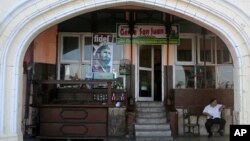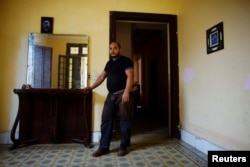Communist-run Cuba said on Tuesday it was suspending issuing new licenses for certain private-sector activities from bed-and-breakfasts to restaurants until it had implemented new measures to curb wrongdoing such as tax evasion.
The move marked a pause in Cuba's seven-year old push to expand self-employment in a bid to cut the bloated state payroll and boost the ailing, Soviet-style economy, and will come as a blow for many Cubans hoping to strike off on their own.
It also hints at unease among some in the ruling Cuban Communist Party that free market reforms may have gone too far, amid a broader debate about rising inequality on the island. The average state monthly wage is $30, the same sum a B&B owner can charge visitors for a night's stay.
"The regulation states that new authorizations for a group of activities will not be given until the perfection of self-employment has been achieved," the party newspaper Granma wrote. According to a resolution published on Tuesday in the Official Gazette, the government has temporarily suspended licenses for those wanting to rent their homes, open a restaurant or cafe, or provide construction services.
Also affected are would-be music or language teachers, party organizers and a handful of other professions.
Cuba will also definitively no longer be issuing licenses for wholesale and retail sellers of agricultural goods, vendors of CDs or DVDs, and operators of recreation equipment, according to the gazette.
"This news was like a bucket of cold water for me," said Antonio Victor Ruperon, 31, who said he had invested more than $3,000 in construction materials to convert his house into a cafeteria and bed and breakfast (B&B). "It seems like I have lost everything."
Some Cubans worry restricting private business, thereby dampening the country's economic potential, is the government's solution to rising inequality.
"This doesn't help us at all, because these businesses may be private but in truth they are another source of income for the country," said Margelis Santiesteban, 31, a waitress at a private cafeteria.
The number of self-employed on the island has more than tripled to 567,982, some 12 percent of the total number of employed, since President Raul Castro in 2010 launched his plan to expand private enterprise.
But Castro said in a speech to parliament last month that the government had detected wrongdoings in the sector, from tax evasion to the use of goods of illicit provenance, that it needed to curb before expanding further.
"We are not renouncing the development of the self-employed sector," said Castro. "However, it is necessary to ... resolutely confront the illegalities and other deviations from the established policy."
Castro also said the state had detected cases where "one same person has two, three, four and even five restaurants," which was problematic in a country that pledges to prevent the accumulation of wealth by individuals.
He said the government had agreed on a package of such measures that it would publish in due course.
Cuba would start requiring certain entrepreneurs such as B&B owners, builders and restaurant owners to use bank accounts that the tax authority could verify, Granma wrote on Tuesday.

